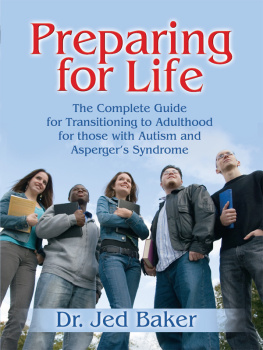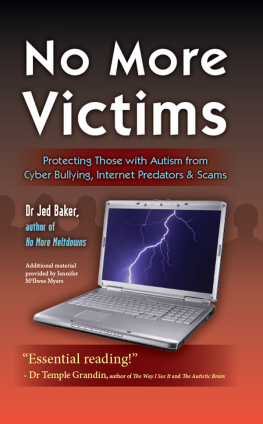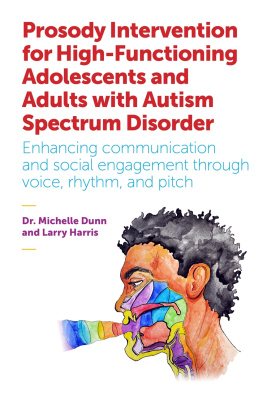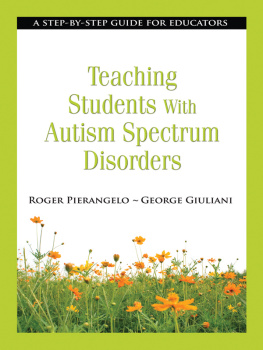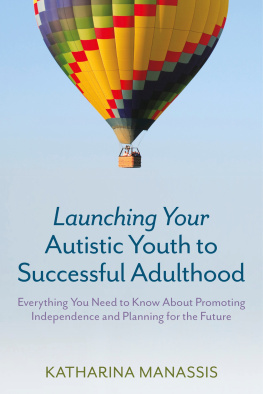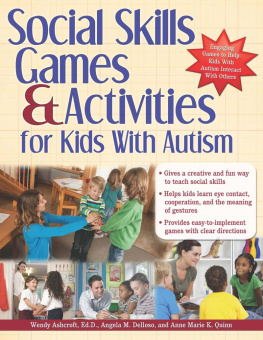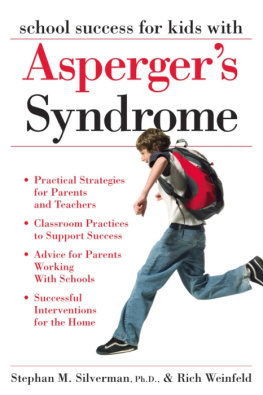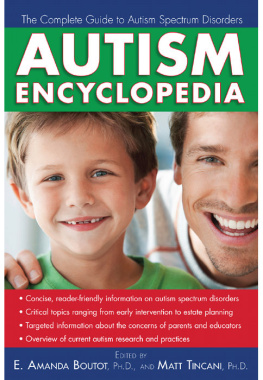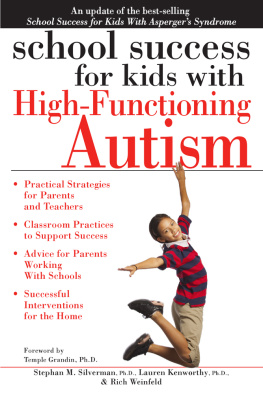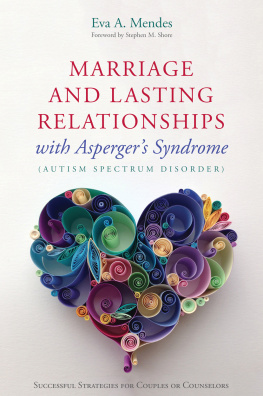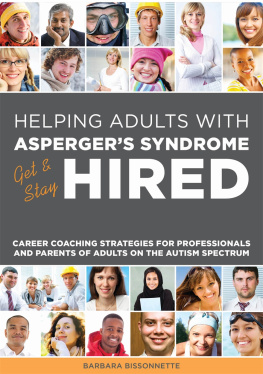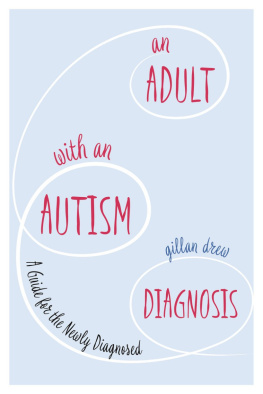
Preparing for Life
The Complete Guide
for Transitioning to Adulthood
for those with Autism and
Aspergers Syndrome
Dr. Jed Baker
Preparing for Life
The Complete Guide for Transitioning to Adulthood for those with Autism and Aspergers Syndrome
All marketing and publishing rights guaranteed to and reserved by

721 W. Abram Street
Arlington, Texas 76013
800-489-0727
817-277-0727
817-277-2270 (fax)
E-mail:
www.FHautism.com
Copyright 2005, Dr. Jed Baker
All rights reserved.
Printed in USA.
No part of this book may be reproduced in any manner whatsoever without written permission of Future Horizons, Inc. except in the case of brief quotations embodied in reviews.
Cover design and book layout: Matt Mitchell, www.mattmitchelldesign.com
ISBN 978-1-941765-19-7
Acknowledgments
I wish to thank all the students, their families, teachers, and employers who have taught me what skills are important to teach in preparation for adult life. Their needs and goals guided the content of this book.
I also want to thank my colleagues who made crucial contributions to the work. Rick Blumberg, Ph.D., wrote , which in many ways is the centerpiece of the book. Daphne Gregory, M.A. was inspirational in detailing her transition model and expressing her constant enthusiasm for preparing her students for adulthood. Kenwin Nancoo, LPC, NCC, CNLP, M.S. made significant contributions to the dating sections as only an eligible bachelor can do. Ilana Levitt, M.A., M.Ed., LPC, offered extremely helpful suggestions to me regarding the employment section.
At some point, it felt like Preparing for Life might take a lifetime to complete as several parts were rewritten to make it a better work. I wish to thank Kelly Gilpin for her endless patience in editing and reediting through this process.
Last but not least, thank you to my wife Beth and our children, Jake and Lindsay, for continually trying to prepare me for adulthood and putting up with me as I squeeze every extra hour into writing skill lessons.
Jed Baker, Ph.D.
I recently was asked to create a life skills training curriculum for two teens in a special high school program for students with Aspergers Syndrome (AS). Although many students with AS remain in mainstream high school settings, these very bright young men had long histories of behavioral and academic difficulties in their previous school settings that led them to this specialized program. I was told they needed help with their social skills, but might not be open to receiving such help. After years of social rejection, they wanted to be accepted for who they were rather than to be told they need to change. How then could I motivate them to want to learn new social behaviors without suggesting that there was something problematic about their current social functioning?
I thought it might be interesting to have them participate in teaching others about social skills rather than convincing them that they needed to learn new skills. I arranged for them to be paid for their participation in the making of a new social skill picture book that demonstrated the right and wrong ways to enact a variety of skills. Although we selected skills that I knew they needed to work on, I presented the activity as a project primarily to help others. One student took to the activity with some enthusiasm. He posed for pictures, sequenced pictures together on the computer and added text to create a story.
The other student was more reluctant to participate. I decided to show him an example of a picture skill so he could get a better idea of the project. I showed him the skill for greeting people appropriately since he typically greeted others with the phrase death to all. His reaction was honest and thought provoking, I will not participate. Your depictions of right and wrong are typical psychological propaganda. I had to admire his insight and wit. He was right. Who was I to tell others how to behave in a socially appropriate manner? As my wife will attest, I am certainly not the model of social grace and style.
This young man reminds us that there is no one person who can dictate what is appropriate social behavior. However, there are certainly behaviors that, depending on the situation, will facilitate or get in the way of reaching individuals goals. This young man has entertained the notion of getting agraphic design degree at some point. Saying death to all to greet a college admissions officer might not be a very practical approach to reaching his goal. In contrast, saying, death to all to those who know and accept his sarcastic wit might even help maintain friendships by bringing humor to his interactions.
It is my philosophy that the skills in this book and others do not represent a model of social correctness. They are, however, ideas about how to behave that may help students reach their own goals. People with Aspergers need acceptance, not judgments that how they behave is incorrect. The skill lessons in this book can be thought of as ways to expand social repertoires to reach personal goals rather than change faulty behaviors. The message is, dont alter the uniqueness that makes you special in so many great waysjust add to what you can do.
Aspergers Syndrome and Autism Spectrum Disorders
Autism spectrum disorders (also know as pervasive developmental disorders) refer to a wide range of symptoms that span across an individuals sensory, cognitive, motor, language, and social-emotional development. Aspergers Syndrome, autism, and Pervasive Developmental Disorder - Not Otherwise Specified (PDD-NOS) are some of the most common autism spectrum disorders.
The autism spectrum is considered a spectrum because individuals vary greatly from each other. Intellectually, some fall in the mentally retarded range while others clearly fall in the superior intellectual range. Aspergers Syndrome and High Functioning Autism involve, by definition, individuals with average to above-average intellectual ability and better communication skills than those with more classic autism who tend to have lower intellectual functioning and more communication difficulties. Those who have symptoms of an autism spectrum disorder, but do not meet the full criteria for a specific diagnosis like autism or Aspergers Syndrome are typically given the diagnosis of Pervasive Developmental Disorder Not Otherwise Specified (PDD-NOS). This actually represents the largest category of individuals on the spectrum, which means that although we can identify individuals on the spectrum, we are not that good at making specific differential diagnoses among autistic spectrum disorders.
Current diagnostic criteria describe autism spectrum disorders as involving difficulties in three general areas: (a) qualitative impairment in social interactions (e.g., impairment in responding to or initiating interactions with others, or failure to form peer relationships), (b) qualitative impairment in verbal and nonverbal communication (e.g., no mode of communication, or impairment in the ability to initiateor sustain conversations), and (c) restricted, repetitive, and stereotyped patterns of behavior, interests or activities (e.g., preoccupation with restricted patterns of interest, or inflexible adherence to nonfunctional routines or rituals) (American Psychiatric Association, 1994).
Problems with social interaction can include difficulties initiating or responding to conversation, difficulties using or responding to nonverbal gestures (e.g., pointing out objects), lack of or inconsistent eye contact, impairments in responding to others feelings, difficulties working cooperatively with peers, and subsequent failure to develop peer relationships. Understanding what to do or say in social situations is a core concern for autistic individuals.
Next page
